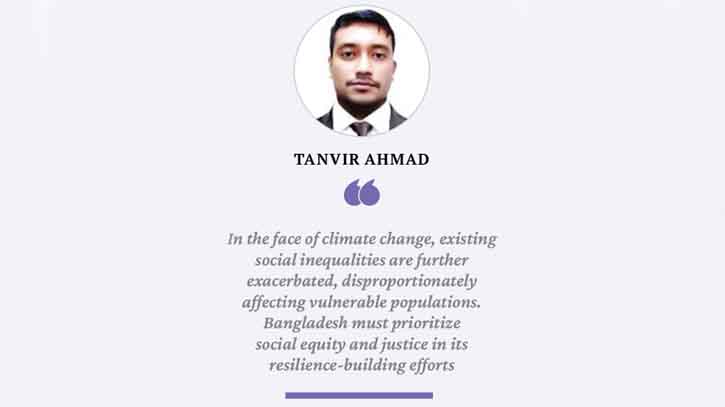
Photo : TDM
Bangladesh, a country renowned for its lush landscapes and vibrant culture, faces an unprecedented threat from climate change. As rising sea levels, frequent cyclones, and erratic weather patterns become the new norm, it is crucial to adopt a systems-change approach to build climate resilience. This article delves into the unique context of Bangladesh and explores the imperative of embracing systems thinking to address the multifaceted challenges posed by climate change.
Bangladesh is situated in a geographically vulnerable position, with a low-lying deltaic landscape and a dense population heavily dependent on agriculture and natural resources. The consequences of climate change in this context are profound and multifaceted. Flooding disrupts livelihoods, salinity intrusion affects agricultural productivity, and extreme weather events amplify risks to infrastructure and human settlements. Recognizing these interconnected challenges is the first step towards effective climate resilience.
Traditional approaches to climate change often focus on individual sectors or issues in isolation, failing to capture the complexity and interdependencies present in Bangladesh. A systems-change approach acknowledges the intricate web of relationships between social, economic, and environmental factors. It calls for integrated strategies that address multiple dimensions simultaneously, allowing for a more comprehensive and effective response to climate change impacts.
A key aspect of systems change involves integrating climate resilience considerations into national and local planning processes. In Bangladesh, this means aligning climate adaptation and mitigation measures with sectors such as agriculture, water management, urban planning, and disaster risk reduction. By breaking down silos and fostering policy coherence, Bangladesh can maximize the effectiveness of resilience efforts and ensure a coordinated response across various sectors.
Building climate resilience in Bangladesh requires the collective efforts of diverse stakeholders. Collaboration among government agencies, local communities, NGOs, academic institutions, and international organizations is essential. This collaboration fosters knowledge sharing, resource mobilization, and the exchange of best practices. By pooling together expertise and experiences, Bangladesh can harness collective wisdom to develop context-specific resilience strategies that address the unique challenges faced by its communities.
Communities in Bangladesh are at the forefront of climate impacts and possess invaluable knowledge and resilience strategies rooted in their history and traditions. Engaging and empowering local communities is crucial to building climate resilience. By involving communities in decision-making, planning, and implementation processes, Bangladesh can tap into their wisdom and prioritize locally driven solutions. This not only enhances the effectiveness of resilience initiatives but also strengthens social cohesion and ownership of the adaptation process.
A systems-change approach requires a deep understanding of interdependencies and feedback loops. Bangladesh must assess the intricate relationships between different sectors and their impacts on climate resilience. For instance, the effects of climate change on agriculture can have ripple effects on food security, livelihoods, and social stability. By recognizing these interconnections, Bangladesh can develop strategies that account for potential cascading effects and promote resilience across multiple dimensions.
Bangladesh is rich in natural ecosystems, including mangroves, wetlands, and rivers. Preserving and restoring these ecosystems can provide multiple benefits, such as coastal protection, water regulation, and habitat conservation. Integrating ecosystem-based approaches, such as afforestation, mangrove restoration, and sustainable land management practices, can enhance community resilience. Additionally, climate-smart infrastructure, such as flood-resistant housing, resilient roads, and cyclone shelters, should be prioritized.
Agriculture is a vital sector in Bangladesh, and climate change poses significant risks to food security. Promoting climate-smart agricultural practices, such as resilient crop varieties, efficient irrigation systems, agroforestry, and improved post-harvest management, can enhance adaptive capacity. Diversification of livelihood options beyond agriculture is also important for reducing vulnerability.
Climate resilience requires a knowledgeable and skilled workforce. Bangladesh must invest in education and capacity-building programs that equip individuals with the necessary tools to navigate the challenges of a changing climate. By promoting climate literacy, training government officials, and fostering a culture of innovation, Bangladesh can nurture a generation of change agents who can drive the implementation of effective resilience strategies.
In the face of climate change, existing social inequalities are further exacerbated, disproportionately affecting vulnerable populations. Bangladesh must prioritize social equity and justice in its resilience-building efforts. By ensuring equal access to resources, protecting the rights and livelihoods of marginalized communities, and promoting gender equality, Bangladesh can create a more just and resilient society that leaves no one behind in the face of climate change.
In Bangladesh, where the impacts of climate change are already being felt, adopting a systems-change approach is crucial for building climate-resilient communities. By prioritizing multi-stakeholder collaboration, community engagement, risk assessment, integrated planning, ecosystem-based approaches, climate-smart agriculture, education, social equity, and adaptive management, Bangladesh can enhance its capacity to cope with climate change impacts and promote sustainable development. Furthermore, as an international leader in climate change adaptation, Bangladesh can share its experiences, knowledge, and best practices with other vulnerable countries facing similar challenges. This can foster global collaboration and collective action in addressing the impacts of climate change, promoting resilience, and achieving the Sustainable Development Goals.
Bangladesh, a nation at the forefront of climate vulnerability, has a unique opportunity to lead the way in building climate-resilient communities. By embracing a systems-change approach that encompasses collaboration, community empowerment, climate-smart infrastructure, education, and social equity, Bangladesh can carve a path towards a sustainable and prosperous future. As the world grapples with the immense challenges of climate change, Bangladesh can stand as a beacon of hope, demonstrating the transformative power of systems thinking in the pursuit of climate resilience. Through collective efforts, Bangladesh can empower its people, protect its ecosystems, and inspire global action towards a resilient and sustainable world.
In the face of escalating climate change impacts, Bangladesh must embrace a systems-change approach to build climate resilience. By recognizing the interconnected nature of climate challenges, integrating planning and policies, fostering collaboration, empowering communities, and understanding interdependencies, Bangladesh can develop robust strategies that address the complex realities of climate change. With a holistic and inclusive approach, Bangladesh can navigate the path towards a climate-resilient future, safeguarding its people, ecosystems, and cultural heritage for generations to come.
The writer is Climate Change & Public Health Researcher
TDM/SD








